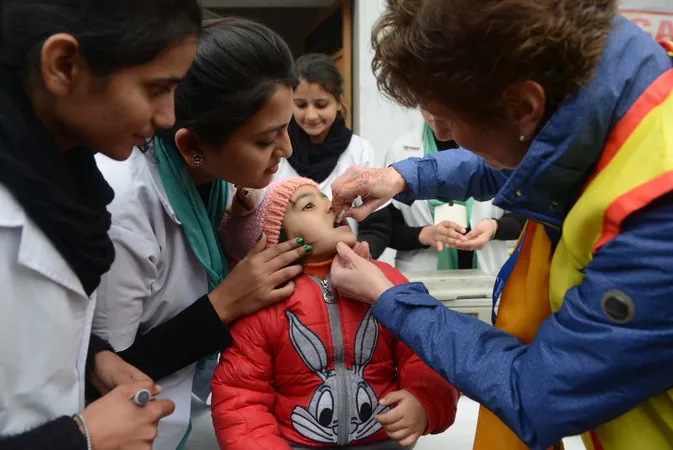
The Ugly Truth About Our Choices: How Ignorance Fuels Pandemics and Economic Struggles
2025-04-07
Author: Jia
The Dissonance Between Individual Desires and Collective Choices
In a world where collective choice often leads society down dark paths, a troubling phenomenon emerges: the decisions we make as a society can be far removed from our individual desires. This dissonance is evident in the ongoing battle against polio, an entirely preventable disease still afflicting communities in Afghanistan and Pakistan—lands where access to vaccines is stifled by political and cultural decisions.
Personal Tragedy Amid Preventable Disease
Imagine, for a moment, a father in one of those regions, faced with the horrific reality of losing a child to a disease that could easily be eradicated. The tragic irony is that, while polio was eliminated in most parts of the world years ago, it persists in these countries due to leaders’ refusal to grant vaccination initiatives the freedom to operate. Strategies pioneered by international health workers and organizations like Rotary International, effective for decades, fall victim to bureaucratic obstacles and skepticism.
The Legacy of Vaccine Development
The history of polio vaccines, developed by pioneers like Jonas Salk, showcases a broader narrative of resilience fueled by meritocratic ideals. Salk himself emerged from humble beginnings, pulling himself up through education in New York City, where opportunities awaited those willing to grasp them—not the privileged, but the determined. Consider the collective achievements of generations who contributed to this progress, and it becomes evident that societal advancements hinge on the choices we make collectively.
Measles Outbreak: A Reflection of Misinformation
Let’s reflect on another example: the ongoing measles outbreaks in various American communities, attributed to a growing anti-vaccination sentiment. One poignant case involved a mother from Texas who, despite witnessing her daughter succumb to measles complications, remained staunchly opposed to vaccinations. Her words reflect a dangerous mindset: "The measles wasn’t that bad." This thinking not only jeopardizes individual lives but threatens public health at large, underscoring how easily misinformation and fear can flourish in echo chambers.
Grassroots Activism and Collective Action
Yet, amidst such challenges, there are shining examples of American spirit. Organizations such as Rotary International have mobilized efforts to combat polio effectively. With initiatives raising billions for vaccination campaigns across countless countries, they've demonstrated how grassroots activism can take on monumental global health crises. Their approach—rallying volunteers for organizing fundraising events and community outreach—highlights the difference between mere chatter and meaningful action.
The Contrast Between Altruism and Self-Interest
The contrast between those who work tirelessly for altruistic causes and those self-serving elites becomes glaring. While dedicated individuals build pathways to healthier futures, a faction remains focused only on self-enrichment, often hampering progress with petty political maneuvers. The legacy of prominent benefactors like Bill Gates—who financially backs vaccination efforts—serves as a reminder that proactive, collective efforts can yield dramatic outcomes. Worldwide polio cases have plummeted by an astounding 99.9% since the Rotary clubs initiated their vaccination projects.
Economic Implications of Collective Choices
But the lessons extend beyond health crises. They touch upon the economic relationships that govern our global standing. There’s an ongoing debate about tariffs and trade policies with nations like China—one that often stirs nationalistic fervor but neglects practical implications. Instead of punitive tariffs that only serve to enrich politically connected firms, proactive engagement through education, negotiation, and collaborative policies could pave the way to a more secure economy.
Navigating Complex Narratives
Amid these complexities, individuals must remain vigilant about the narratives that shape their beliefs. The media often frames discussions around pressing issues—gun control, for instance—without delving deep into the constitutional implications and individual rights that lie at the core of these debates.
The Two Currents of American Society
As we navigate through these multilayered discussions about choice, responsibility, and collective action, two distinct currents emerge in American society. On one hand, we have the best among us—those dedicated to uplifting communities through selfless service. On the other, we encounter a faction driven by personal gain and divisive politics. The choice lies with us, to align with the former and embrace the power of informed, collective action for a brighter future.
Conclusion: Pursuing Knowledge and Engagement
In a world rife with misinformation and shortsighted decisions, let us pursue knowledge and community engagement, ensuring that the legacy we leave addresses the true potential of humanity. The stakes are high, and the time to act is now!
 Brasil (PT)
Brasil (PT)
 Canada (EN)
Canada (EN)
 Chile (ES)
Chile (ES)
 Česko (CS)
Česko (CS)
 대한민국 (KO)
대한민국 (KO)
 España (ES)
España (ES)
 France (FR)
France (FR)
 Hong Kong (EN)
Hong Kong (EN)
 Italia (IT)
Italia (IT)
 日本 (JA)
日本 (JA)
 Magyarország (HU)
Magyarország (HU)
 Norge (NO)
Norge (NO)
 Polska (PL)
Polska (PL)
 Schweiz (DE)
Schweiz (DE)
 Singapore (EN)
Singapore (EN)
 Sverige (SV)
Sverige (SV)
 Suomi (FI)
Suomi (FI)
 Türkiye (TR)
Türkiye (TR)
 الإمارات العربية المتحدة (AR)
الإمارات العربية المتحدة (AR)